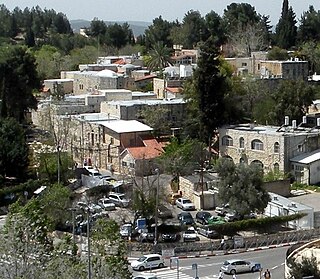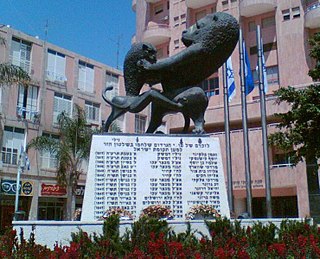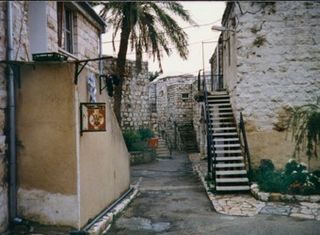 W
WThe Irgun was a Zionist paramilitary organization that operated in Mandate Palestine between 1931 and 1948. The organization is also referred to as Etzel, an acronym of the Hebrew initials, or by the abbreviation IZL. It was an offshoot of the older and larger Jewish paramilitary organization Haganah. When the group broke from the Haganah it became known as the Haganah Bet, or alternatively as haHaganah haLeumit or Hama'amad. Irgun members were absorbed into the Israel Defense Forces at the start of the 1948 Arab–Israeli war.
 W
WThe Altalena Affair was a violent confrontation that took place in June 1948 by the newly created Israel Defense Forces against the Irgun, one of the Jewish paramilitary groups that were in the process of merging to form the IDF. The confrontation involved a cargo ship, the Altalena, captained by Monroe Fein and led by senior IZL commander Eliyahu Lankin, which had been loaded with weapons and fighters by the independent Irgun, but arrived during the murky period of the Irgun's absorption into the IDF.
 W
WRobert Emmet Briscoe was an Irish Fianna Fáil politician who served as a Teachta Dála (TD) in the Oireachtas from 1927 to 1965.
 W
WThe Deir Yassin massacre took place on April 9, 1948, when around 130 fighters from the Far-right Zionist paramilitary groups Irgun and Lehi killed at least 107 Palestinian Arabs, including women and children, in Deir Yassin, a village of roughly 600 people near Jerusalem. The assault occurred as Jewish militia sought to relieve the blockade of Jerusalem during the civil war that preceded the end of British rule in Palestine.
 W
WThe Etzel House, commonly known as Beit Gidi, is a museum located in Tel Aviv, Israel dedicated to the Zionist paramilitary organization Irgun, also known by its acronym Etzel.
 W
WThe Haifa Oil Refinery massacre took place on 30 December 1947 in Mandatory Palestine. It began when six Arabs were killed and 42 wounded after members of the Zionist paramilitary organisation, the Irgun, threw a number of grenades at a crowd of about 100 Arab day-labourers. These Arab day-labourers had gathered outside the main gate of the then British-owned Haifa Oil Refinery to look for work.
 W
WFrom 1944 to 1948, Irgun and Lehi men being held without trial at the Latroun concentration camp were deported by the British Mandate of Palestine authorities to internment camps in Africa, located in Sembel, Carthago, Sudan and Gilgil. The deportees were returned in July 1948, only after the Israeli Declaration of Independence.
 W
WThe King David Hotel bombing was a terrorist attack carried out on Monday, July 22, 1946, by the militant right-wing Zionist underground organization the Irgun on the British administrative headquarters for Mandatory Palestine, which was housed in the southern wing of the King David Hotel in Jerusalem during the Jewish insurgency in Mandatory Palestine. 91 people of various nationalities were killed, and 46 were injured.
 W
WMarvin Liebman was an American conservative activist and fundraiser, and later in his life, a gay rights advocate.
 W
WOlei Hagardom refers to members of the two Jewish Revisionist pre-state underground organisations Irgun and Lehi, who were tried in British Mandate courts and sentenced to death by hanging, most of them in Acre prison. There were 12 Olei Hagardom.
 W
WThe Revolt, also published as Revolt, The Revolt: Inside Story of the Irgun and The Revolt: the Dramatic Inside Story of the Irgun, is a book about the militant Zionist organization Irgun Zvai Leumi, by one of its principal leaders, Menachem Begin. In Israel, the organization is commonly called Etzel, based on its Hebrew acronym.
 W
WThe Sergeants affair was an incident that took place in Mandate Palestine in July 1947 during Jewish insurgency in Palestine, in which the Jewish underground group Irgun kidnapped two British Army Intelligence Corps NCOs, Sergeant Clifford Martin and Sergeant Mervyn Paice and threatened to hang them if the death sentences passed on three Irgun militants: Avshalom Haviv, Meir Nakar, and Yaakov Weiss, were carried out. The three had been captured by the British during the Acre Prison break, tried, and convicted on charges of illegal possession of arms, and with 'intent to kill or cause other harm to a large number of people'. When the three men were executed by hanging, the Irgun killed the two sergeants and hanged their booby-trapped bodies in a eucalyptus grove near Netanya. When the bodies were found, the booby trap injured a British officer as they were cut down. This act was widely condemned in both Palestine and the UK. After hearing of the deaths, some British troops and policemen attacked Jews in Tel Aviv, killing five and injuring others. The killings also sparked off rioting in some British cities.
 W
WSidney Stanley was a Polish émigré to the UK who became a dubious businessman of precarious ethics before claiming to be a contact man, able to influence politicians and civil servants in return for cash bribes, claims that led to a great scandal and investigation by the Lynskey tribunal of 1948. There is also evidence that Stanley spied against the UK for the armed nationalist activist Irgun organisation. Stanley was ordered deported, but had lost his Polish nationality, and as a result was a stateless person. Stanley was then placed under heavy restrictions and police surveillance. In 1949, he evaded police and fled to France and thence to Israel, where he was granted citizenship through right-of-return. There he lived out the remainder of his life in relative obscurity.
 W
WMuseum of Underground Prisoners is a museum in Jerusalem, commemorating the activity of the Jewish underground—Haganah, Irgun and Lehi—during the period leading up the establishment of the State of Israel.
 W
W W
W W
W W
W W
W W
W W
W W
W W
W W
W W
W